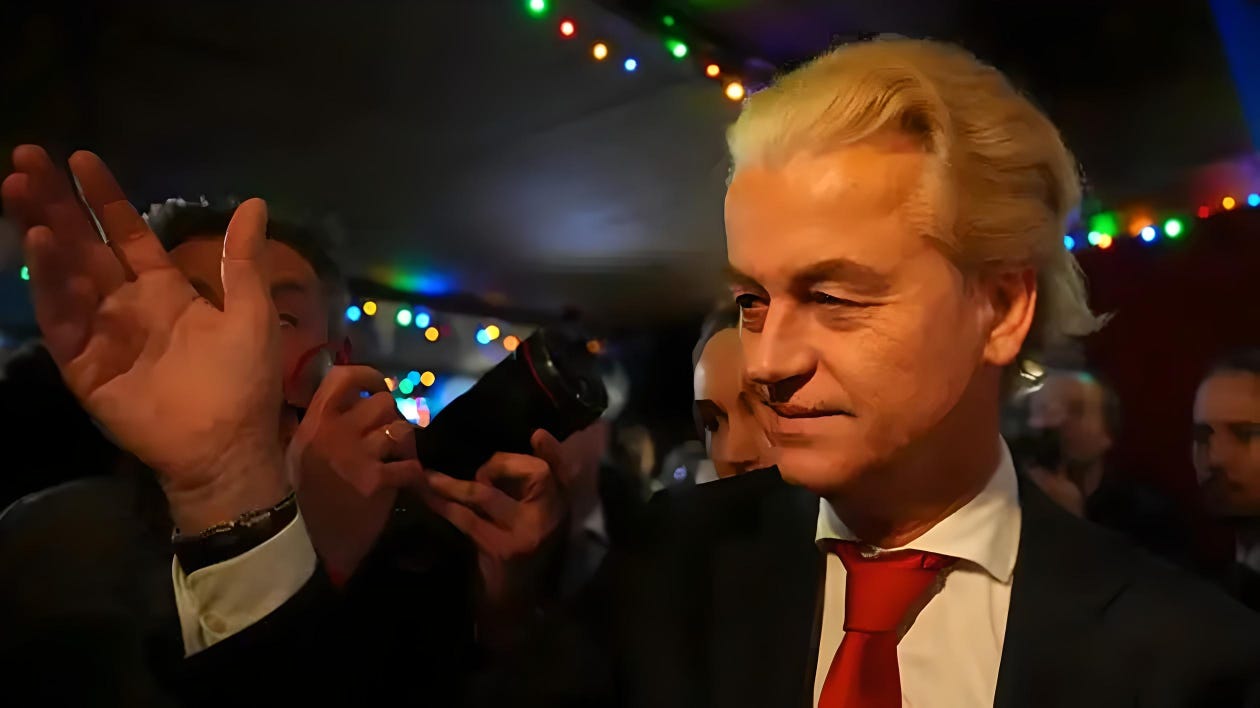A Pyrrhic Victory for Geert Wilders
Hans Vogel explores the victory of Geert Wilders in the Dutch general elections, a triumph overshadowed by the EU’s aggressive encroachment on national sovereignty, rendering such national political achievements potentially futile.
After more than two decades of humiliation, ridicule and ostracism, last night (22 November) Geert Wilders had his finest hour. His Islamophobic PVV (Party for Freedom), which he founded in 2006, won the Dutch general elections, obtaining almost one quarter of the popular vote. It should be borne in mind, however, that more than one in five eligible voters did not cast their vote, a record for such elections in the Netherlands.
Wilders, who has never lost the characteristic accent of the southern part of the Netherlands where he was born (and which is actually looked down upon by Dutch elites), is of Indonesian descent. Married to a Hungarian-born woman, Wilders has long entertained close relations with the Israeli embassy in The Hague. Some fifteen years ago, Wilders paid weekly visits to the embassy, and was suspected of receiving money and instructions from his Israeli friends. As a result, the Dutch state spy service kept close tabs on Wilders, often referred to in some media as “Bibi.”
The PVV is likely to get 37 seats in the 150-seat Lower Chamber of the National Parliament. It is quite surprising that another right-wing party, the dynamic FvD (Forum for Democracy), led by young, charismatic and articulate politicians and popular among young voters, will be almost halved, going from five to only three seats. Since it is likely the popular support for the PVV is even higher, the election results allow room for doubts. There is a distinct smell of manipulation and one should always bear in mind Stalin’s dictum that voting results are not determined by the votes cast but by those who count those votes.
Being the leader of what is now the biggest party in parliament, Wilders will be charged with sounding out the other parties with the purpose of building a new government coalition. There is actually only one possibility for him: a coalition of PVV with the Liberal VVD (Party for Freedom and Democracy), with 24 seats, and newcomer NSC (New Social Contract), with 20 seats, in order to attain the required majority of at least 76 seats.
By itself, the Left will not be able to form a government. Since quite a few parties, including the NSC, have announced they will never enter a coalition with the PVV, the actual chances of the PVV coming to power are rather slim, as a number of commentators have been observing.
The most likely coalition may be one composed of the Green Socialists (GL/PvdA, 25 seats), VVD, NSC and D66 (9 seats), for a total of 78 seats. On the basis of how long it took to put together previous coalition governments, it may be up to one year before a new government assumes power. In the meantime, the caretaker cabinet, led by NATO Secretary General hopeful Mark Rutte, will duly carry out whatever Brussels and Washington DC order.
From a broader perspective, the Dutch elections seem politically meaningless. At best, they may be regarded as a kind of official opinion poll, showing that if not a majority of the Dutch, at least an impressive plurality rejects government policies focused on climate lunacy, woke lunacy, Russophobia and other idiocies, and guided by the US and international crime syndicates such as WEF and WHO. The big vote in favor of the PVV is to be explained for the most part by a broad rejection of government-supported immigration of hundreds of thousands of people from Africa and the Near East. For over two decades, the VVD, Social Democrats, Greens and other ruling parties have been using those culturally different immigrants to foment social discord, according to the principle of “divide and rule.” In this respect, with the PVV victory, a page seems to have been turned.
On the same day as the Dutch national elections, the EU Parliament approved a plan put forward by a committee led by Belgian mental and dental patient Guy Verhofstadt, which will abolish national sovereignty in the EU member states. The plan will give the unelected EU commissars full authority in most key realms of government and administration. These include climate, public health, foreign affairs, internal security, defense, education, environment, and migration (meaning, of course, the massive immigration of Africans and Muslims). Most importantly, the plan calls for the abolition of veto rights for individual member states.
In view of the adoption of the Verhofstadt plan, the surprising decision of about one third of Dutch members of parliament not to run for reelection suddenly becomes understandable. All along it was clear that national sovereignty was heading for the exit and that national parliaments would become totally insignificant, if not abolished altogether.
In other words, even if Wilders might succeed in putting together a coalition government, it will fundamentally have no more authority than, say, a municipal government. By the time it takes office, the caretaker Rutte cabinet may have agreed to the Verhofstadt plan.
Short of a collapse of NATO and the EU, which is likely (and hopefully) to follow in the wake of the Russian victory in the Ukraine, the band of sinister criminals running the EU will be in full charge. Under their leadership, Europe will turn into a full-blown hell-hole of the kind precisely Wilders has been trying to prevent at all costs.
If it cannot be stopped, the EU steamroller will proceed and flatten everything in its path.





Great piece. Mr. Vogel shares a sobering - and important - view. I knew it was too soon to celebrate, and Vogel explains why.
Still though, I suspect that it is at least encouraging to see Dutch voters moving in the right direction.